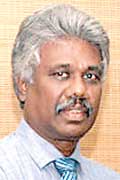Reply To:
Name - Reply Comment
 Plant machinery, pipe-borne drinking water affected; voting as well
Plant machinery, pipe-borne drinking water affected; voting as well
At around 6 a.m. on elections day the operations officer at the Ambatale water treatment plant noticed a patch of oil floating in the Kelani River. As this was an occasional occurrence he let it pass. However as the oil had continued to flow even after a lapse of 30 minutes, immediate measures were taken to shut down the plant and stop pump water from the river.
Amidst rumours of suspected sabotage the Coca Cola Company at Biyagama has taken responsibility for the leak and to pay compensation for the damages caused.
However according to the Central Environmental Authority (CEA), the Environmental Protection License (EPL) of the multi-national beverage company has been temporarily suspended and measures were being taken to assess the damages. The CEA said that damage costs are being calculated and they are expecting estimates from the Water Board, MEPA and National Aquatics Resources Research and Development Agency (NARA) by next week.
The oil that had accidentally been pumped into the Ambatale plant had blocked the nozzles and filters in the plant machinery, and reached the reservoirs and sedimentation tanks. Speaking to the , Water Board Director General Ranjith Perera said that both reservoirs had to be skimmed, sedimentation tanks flushed out, nozzles and filters replaced and all equipment cleaned prior to resuming operations.
.jpg)
Reservoirs being cleaned after the leak
“For 9 hours we did not take in water for distribution. It was only when we noticed that the water had cleared that we started working the pumps. According to SLF 614 standards for pure drinking water there is a permitted amount of very low level of tainting. We started releasing the water when this level was attained. Usually drinking water has a zero percentage of oil. Many would have noticed a difference in taste and smell because of this,” Perera also said that the results of the contaminated water samples sent to India for testing were expected soon.
Prasad Pushpakumar and P.A. Shriyani of Ambatale were surprised when they tasted oil in their drinking water. They said, “We knew about this only when we watched the news at night. We did not use tap water for drinking because of the unusual taste. It was restored in a day but as we were fearful of it being contaminated we did not use water for three days and used water from a nearby well for drinking.” Shriyani also added that a few people who were inconvenienced by this were unable to go cast their vote.
Meanwhile D.K. Bandara a construction worker at Ambathale said that they were not affected on election day as the oil pollution was controlled. However he said that oil droplets remained in the water for a day or two.
.jpg)
Floating patches of oil near the pumping station
The Ambatale water plant operations manager R.P.P. R. Rajapakse said they were able to find the reason for the leak by tracing the oil flow to its point of origin along the river. IT WAS found that the Coca Cola Company that was 4 kilometres away at Biyagama was responsible for the leak.
Upon inspections it was found that oil had leaked from a ruptured underground pipeline that was connected to the storm water drains that flow into the river.
The water supply to many of the distribution points of the Ambatale Plant was disrupted including Colombo, Dehiwela, Mount Lavinia, Maharagama, Battaramulla and Kolonnawa areas.
Adding that there were 450,000 connections in Colombo alone, Perera said that the Water Board received many complaints from residents in Dehiwela of contaminated water while residents along the river side had complained to the MEPA of irritation in the eyes while bathing.
 -Professor Lal Dharmasiri, Chairman Central Environmental Authority (CEA)
-Professor Lal Dharmasiri, Chairman Central Environmental Authority (CEA) - Hemantha Vithanage
- Hemantha Vithanage  -Dr. P.B. Terney Pradeep Kumara
-Dr. P.B. Terney Pradeep Kumara